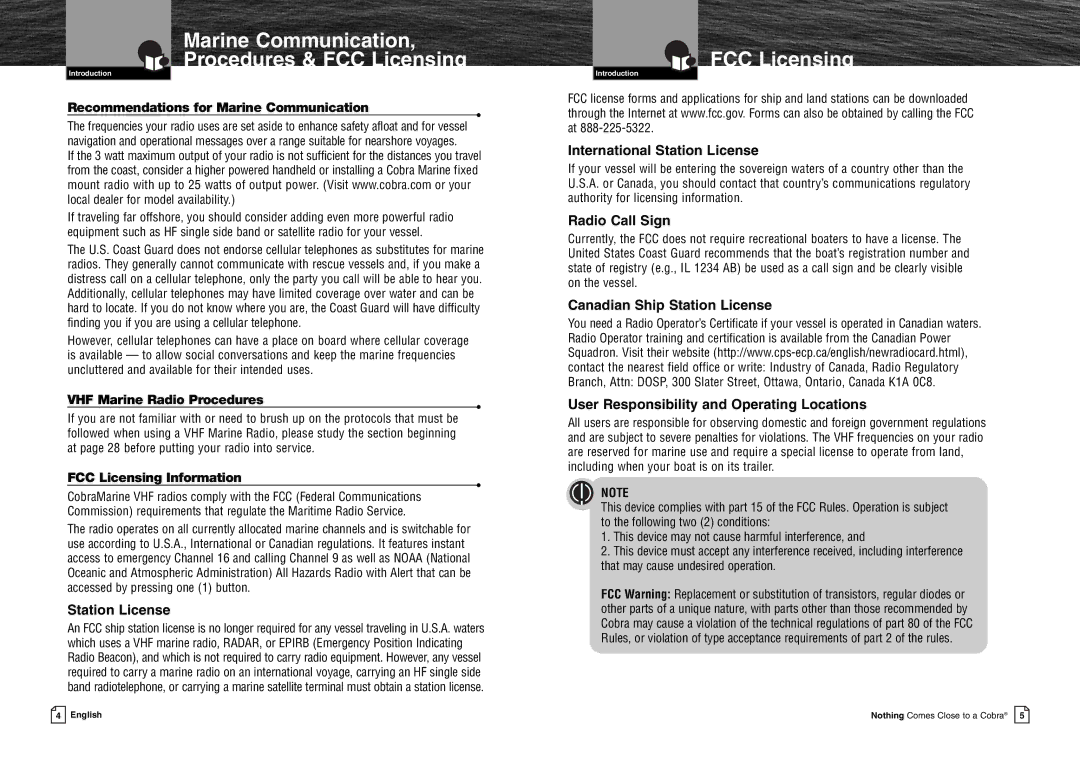
Marine Communication,
Procedures & FCC Licensing
Introduction
Recommendations for Marine Communication
•
The frequencies your radio uses are set aside to enhance safety afloat and for vessel navigation and operational messages over a range suitable for nearshore voyages.
If the 3 watt maximum output of your radio is not sufficient for the distances you travel from the coast, consider a higher powered handheld or installing a Cobra Marine fixed mount radio with up to 25 watts of output power. (Visit www.cobra.com or your local dealer for model availability.)
If traveling far offshore, you should consider adding even more powerful radio equipment such as HF single side band or satellite radio for your vessel.
The U.S. Coast Guard does not endorse cellular telephones as substitutes for marine radios. They generally cannot communicate with rescue vessels and, if you make a distress call on a cellular telephone, only the party you call will be able to hear you. Additionally, cellular telephones may have limited coverage over water and can be hard to locate. If you do not know where you are, the Coast Guard will have difficulty finding you if you are using a cellular telephone.
However, cellular telephones can have a place on board where cellular coverage is available — to allow social conversations and keep the marine frequencies uncluttered and available for their intended uses.
VHF Marine Radio Procedures
•
If you are not familiar with or need to brush up on the protocols that must be followed when using a VHF Marine Radio, please study the section beginning at page 28 before putting your radio into service.
FCC Licensing Information
•
CobraMarine VHF radios comply with the FCC (Federal Communications Commission) requirements that regulate the Maritime Radio Service.
The radio operates on all currently allocated marine channels and is switchable for use according to U.S.A., International or Canadian regulations. It features instant access to emergency Channel 16 and calling Channel 9 as well as NOAA (National Oceanic and Atmospheric Administration) All Hazards Radio with Alert that can be accessed by pressing one (1) button.
Station License
An FCC ship station license is no longer required for any vessel traveling in U.S.A. waters which uses a VHF marine radio, RADAR, or EPIRB (Emergency Position Indicating Radio Beacon), and which is not required to carry radio equipment. However, any vessel required to carry a marine radio on an international voyage, carrying an HF single side band radiotelephone, or carrying a marine satellite terminal must obtain a station license.
FCC Licensing
Introduction
FCC license forms and applications for ship and land stations can be downloaded through the Internet at www.fcc.gov. Forms can also be obtained by calling the FCC at
International Station License
If your vessel will be entering the sovereign waters of a country other than the U.S.A. or Canada, you should contact that country’s communications regulatory authority for licensing information.
Radio Call Sign
Currently, the FCC does not require recreational boaters to have a license. The United States Coast Guard recommends that the boat’s registration number and state of registry (e.g., IL 1234 AB) be used as a call sign and be clearly visible on the vessel.
Canadian Ship Station License
You need a Radio Operator’s Certificate if your vessel is operated in Canadian waters. Radio Operator training and certification is available from the Canadian Power Squadron. Visit their website
User Responsibility and Operating Locations
All users are responsible for observing domestic and foreign government regulations and are subject to severe penalties for violations. The VHF frequencies on your radio are reserved for marine use and require a special license to operate from land, including when your boat is on its trailer.
NOTE
This device complies with part 15 of the FCC Rules. Operation is subject to the following two (2) conditions:
1.This device may not cause harmful interference, and
2.This device must accept any interference received, including interference that may cause undesired operation.
FCC Warning: Replacement or substitution of transistors, regular diodes or other parts of a unique nature, with parts other than those recommended by Cobra may cause a violation of the technical regulations of part 80 of the FCC Rules, or violation of type acceptance requirements of part 2 of the rules.
4 English | Nothing Comes Close to a Cobra® 5 |
